高考英语非谓语动词教案.pdf
- 格式:pdf
- 大小:29.14 KB
- 文档页数:5

目录•非谓语动词概述•不定式的用法与考点•动名词的用法与考点•分词的用法与考点•独立主格结构的用法与考点•非谓语动词的解题技巧与策略非谓语动词概述定义与作用定义非谓语动词是指在句子中不充当谓语的动词,包括不定式、动名词和分词三种形式。
作用非谓语动词在句子中可以充当主语、宾语、表语、定语、状语等,丰富句子的表达方式和内容。
0102 03不定式由“to+动词原形”构成,表示一种未定的动作或状态,具有名词、形容词和副词的性质。
动名词由动词+ing构成,表示一种主动的动作或进行中的状态,具有名词的性质。
分词由动词+ed构成,表示一种被动的动作或已完成的状态,具有形容词和副词的性质。
非谓语动词的形式与谓语动词的区别与联系区别非谓语动词不能独立作谓语,而谓语动词可以;非谓语动词没有时态和语态的变化,而谓语动词有。
联系非谓语动词和谓语动词都可以表达动作或状态,但非谓语动词更侧重于描述性质、特征或伴随状况。
同时,二者在句子中可以相互转换,如将谓语动词变为非谓语动词或将非谓语动词变为谓语动词。
不定式的用法与考点不定式的构成与性质不定式的构成to + 动词原形,有时可以省略to。
不定式的性质具有名词、形容词和副词的性质,可以在句子中担任多种成分。
不定式在句子中的成分主语宾语表语定语状语不定式短语作主语时,常用it作形式主语,把不定式短语后置。
不定式短语可以作动词、介词和形容词的宾语。
不定式短语作表语时,常表示将来的动作或情况。
不定式短语作定语时,与被修饰词有逻辑上的主谓关系或动宾关系。
不定式短语作状语时,表示目的、结果、原因等。
不定式的时态和语态变化时态变化不定式有一般式、进行式和完成式三种时态变化,分别表示不同的时间概念。
语态变化不定式有主动语态和被动语态两种语态变化,根据句子主语与不定式动作的关系选择使用。
考查不定式的构成与性质,要求考生能够正确识别和运用不定式。
考查不定式在句子中的成分,要求考生能够分析句子结构,确定不定式在句子中的作用。
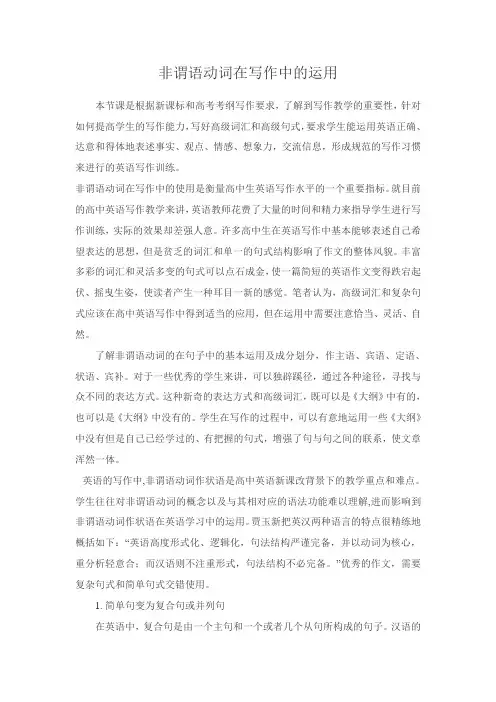
非谓语动词在写作中的运用本节课是根据新课标和高考考纲写作要求,了解到写作教学的重要性,针对如何提高学生的写作能力,写好高级词汇和高级句式,要求学生能运用英语正确、达意和得体地表述事实、观点、情感、想象力,交流信息,形成规范的写作习惯来进行的英语写作训练。
非谓语动词在写作中的使用是衡量高中生英语写作水平的一个重要指标。
就目前的高中英语写作教学来讲,英语教师花费了大量的时间和精力来指导学生进行写作训练,实际的效果却差强人意。
许多高中生在英语写作中基本能够表述自己希望表达的思想,但是贫乏的词汇和单一的句式结构影响了作文的整体风貌。
丰富多彩的词汇和灵活多变的句式可以点石成金,使一篇简短的英语作文变得跌宕起伏、摇曳生姿,使读者产生一种耳目一新的感觉。
笔者认为,高级词汇和复杂句式应该在高中英语写作中得到适当的应用,但在运用中需要注意恰当、灵活、自然。
了解非谓语动词的在句子中的基本运用及成分划分,作主语、宾语、定语、状语、宾补。
对于一些优秀的学生来讲,可以独辟蹊径,通过各种途径,寻找与众不同的表达方式。
这种新奇的表达方式和高级词汇,既可以是《大纲》中有的,也可以是《大纲》中没有的。
学生在写作的过程中,可以有意地运用一些《大纲》中没有但是自己已经学过的、有把握的句式,增强了句与句之间的联系,使文章浑然一体。
英语的写作中,非谓语动词作状语是高中英语新课改背景下的教学重点和难点。
学生往往对非谓语动词的概念以及与其相对应的语法功能难以理解,进而影响到非谓语动词作状语在英语学习中的运用。
贾玉新把英汉两种语言的特点很精练地概括如下:“英语高度形式化、逻辑化,句法结构严谨完备,并以动词为核心,重分析轻意合;而汉语则不注重形式,句法结构不必完备。
”优秀的作文,需要复杂句式和简单句式交错使用。
1. 简单句变为复合句或并列句在英语中,复合句是由一个主句和一个或者几个从句所构成的句子。
汉语的句式往往短小精悍。
而正式场合英语的句式为了追求语言表达的准确度,往往层层限制,多采用层次复杂的复合句式。

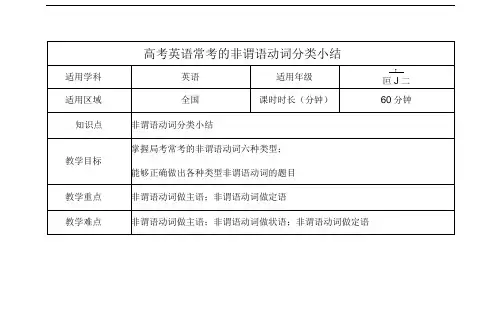
教学过程一、课堂导入给学生非谓语动词的句子,让学生分析句子成分:1. Hearing how others react to the book you have just read creates an added pleasure.聆听别人对你刚才所读的书的反应会增加额外的乐趣。
2. You cannot accept an opinion offered to you unless it is based on facts.你不能接受别人提供给你的意见,除非它有事实依据。
二、复习预习让学生说出to do和doing的各种形式:三、知识讲解考点1:非谓语动词做主语basic first aid techniques will help you respond quickly to emergencies.A. KnownB. Having knownC. KnowingD. Being known本题考查非谓语动词做主语,答案为C。
句意:懂得基本的急救技能有助于对紧急情况做出快速反应。
warm at night, I would fill the woodstove , then set my alarm clock for midnight so I could refill it.A. StayingB. StayedC. To stayD. Stay本题考查非谓语动词作状语,答案为C。
句意:为了在夜里取暖,我总是把火炉填满,然后把闹钟定在午夜,以便我能再填满一次。
考点3:非谓语动词作定语Volunteering gives you a chancelives including your own.A. changeB. changingC. changedD. to change本题考查非谓语动词作定语,答案为D。
句意:当志愿者给了你一个改变别人和你白己的生活的机会China recently tightened its waters controls near the Huangyan Island to prevent Chinese fishing boats from in the South China Sea.A. attackingB. having attackedC. being attackedD. having been attacked本题考查非谓语动词作宾语,答案为C。

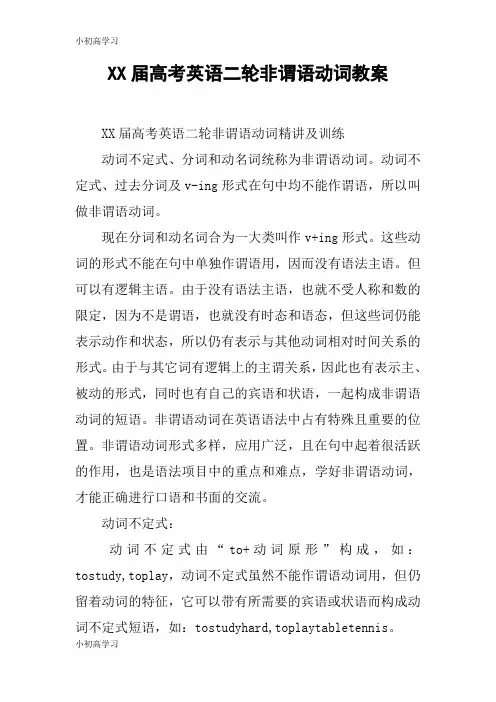
XX届高考英语二轮非谓语动词教案XX届高考英语二轮非谓语动词精讲及训练动词不定式、分词和动名词统称为非谓语动词。
动词不定式、过去分词及v-ing形式在句中均不能作谓语,所以叫做非谓语动词。
现在分词和动名词合为一大类叫作v+ing形式。
这些动词的形式不能在句中单独作谓语用,因而没有语法主语。
但可以有逻辑主语。
由于没有语法主语,也就不受人称和数的限定,因为不是谓语,也就没有时态和语态,但这些词仍能表示动作和状态,所以仍有表示与其他动词相对时间关系的形式。
由于与其它词有逻辑上的主谓关系,因此也有表示主、被动的形式,同时也有自己的宾语和状语,一起构成非谓语动词的短语。
非谓语动词在英语语法中占有特殊且重要的位置。
非谓语动词形式多样,应用广泛,且在句中起着很活跃的作用,也是语法项目中的重点和难点,学好非谓语动词,才能正确进行口语和书面的交流。
动词不定式:动词不定式由“to+动词原形”构成,如:tostudy,toplay,动词不定式虽然不能作谓语动词用,但仍留着动词的特征,它可以带有所需要的宾语或状语而构成动词不定式短语,如:tostudyhard,toplaytabletennis。
动词不定式的形式变化:动词不定式有下列时态和语态的形式变化。
语态式一般式完成式进行式完成进行式主动tobuildtohavebuilttobebuildingtohavebeenbuilding 被动tobebuildtohavebeenbuild动词不定式的基本用法:动词不定式能起名词、形容词和副词的作用,可在句中作主语、表语、宾语补足语、定语和状语用,如:作主语:Tohelpeachotherisgood.作表语:yjobistodrivethetothepoerstationeveryday.动词不定式在系动词be之后作表语,与表示将来时的be+动词不定式结构有所区别,如:ourplanistosetupanotheriddleschoolforthepeasants’children.我们的计划是给农民子弟再成立一所中学。
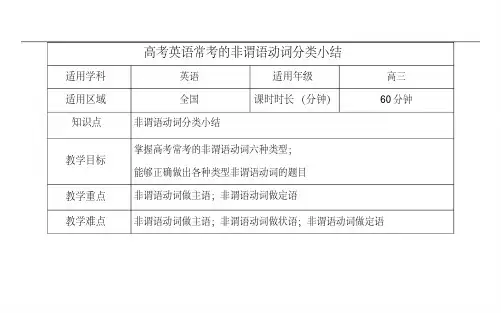
高考英语常考的非谓语动词分类小结适用学科英语适用年级高三适用区域全国课时时长(分钟)60分钟知识点非谓语动词分类小结掌握高考常考的非谓语动词六种类型;教学目标能够正确做出各种类型非谓语动词的题目教学重点非谓语动词做主语;非谓语动词做定语教学难点非谓语动词做主语;非谓语动词做状语;非谓语动词做定语教学过程一、课堂导入给学生非谓语动词的句子,让学生分析句子成分:1. Hearing how others react to the book you have just read creates an added pleasure.聆听别人对你刚才所读的书的反应会增加额外的乐趣。
2. You cannot accept an opinion offered to you unless it is based on facts.你不能接受别人提供给你的意见,除非它有事实依据。
二、复习预习让学生说出to do和doing的各种形式:主动式被动式一般式to do to be done完成式to have done to have been done进行式to be doing /完成进行式to have been doing /主动形式被动形式一般式doing being done完成式having done having been done三、知识讲解考点1:非谓语动词做主语________basic first aid techniques will help you respond quickly to emergencies. A.Known B.Having knownC.Knowing D.Being known本题考查非谓语动词做主语,答案为C。
句意:懂得基本的急救技能有助于对紧急情况做出快速反应。
考点2:非谓语动词作状语____warm at night,I would fill the woodstove,then set my alarm clock for midnight so I could refill it. A.Staying B.StayedC.To stay D.Stay本题考查非谓语动词作状语,答案为C。
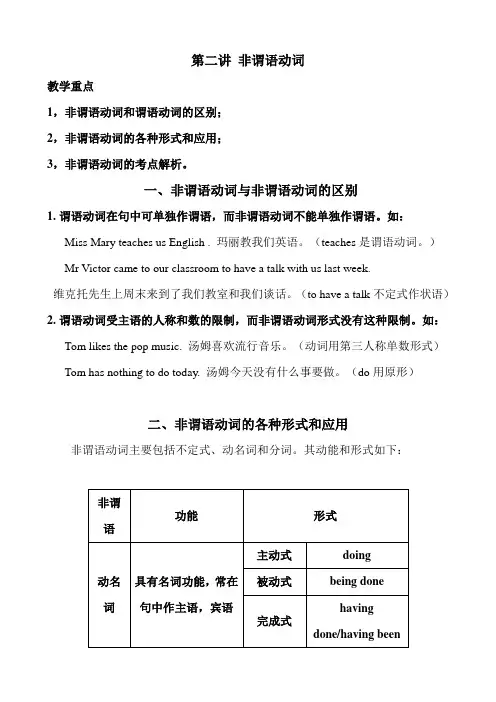
第二讲非谓语动词教学重点1,非谓语动词和谓语动词的区别;2,非谓语动词的各种形式和应用;3,非谓语动词的考点解析。
一、非谓语动词与非谓语动词的区别1.谓语动词在句中可单独作谓语,而非谓语动词不能单独作谓语。
如:Miss Mary teaches us English . 玛丽教我们英语。
(teaches是谓语动词。
)Mr Victor came to our classroom to have a talk with us last week.维克托先生上周末来到了我们教室和我们谈话。
(to have a talk不定式作状语)2.谓语动词受主语的人称和数的限制,而非谓语动词形式没有这种限制。
如:Tom likes the pop music. 汤姆喜欢流行音乐。
(动词用第三人称单数形式)Tom has nothing to do today. 汤姆今天没有什么事要做。
(do用原形)二、非谓语动词的各种形式和应用非谓语动词主要包括不定式、动名词和分词。
其动能和形式如下:非谓语动词在句中所做的成分如下:三、考点解析非谓语动词一直是高考中的热点。
解答非谓语动词的题目时,一定要解析句子结构,确定所设空是谓语动词还是非谓语动词,以及非谓语动词在句子中充当的功能(如状语、定语或宾补);找准相关动词的逻辑主语,确定该动词与逻辑主语是什么关系(主动还是被动);搜索句子中相关的时间信息,确定非谓语动词的恰当形式。
1 动名词和不定式作表语①如果表语是不定式,主语也是不定式;表语是动名词,主语也是动名词。
如:To see is to believe.=Seeing is believing.②动名词作主语的句型。
如:It is no use/no good/useless doing sth.It is a waste of time doing(也可用It is a waste of time to do)③动词不定式和动名词的复合结构:动词不定式的复合结构有两种:It is difficult/easy/possible/necessary/...for sb. to do sth.和It is kind/wise/foolish/considerate/...of sb. to do。
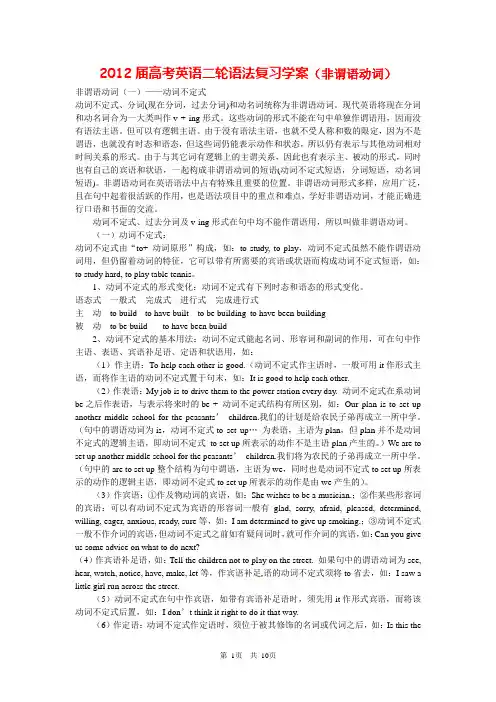
2012届高考英语二轮语法复习学案(非谓语动词)非谓语动词(一)——动词不定式动词不定式、分词(现在分词,过去分词)和动名词统称为非谓语动词。
现代英语将现在分词和动名词合为一大类叫作v + ing形式。
这些动词的形式不能在句中单独作谓语用,因而没有语法主语。
但可以有逻辑主语。
由于没有语法主语,也就不受人称和数的限定,因为不是谓语,也就没有时态和语态,但这些词仍能表示动作和状态,所以仍有表示与其他动词相对时间关系的形式。
由于与其它词有逻辑上的主谓关系,因此也有表示主、被动的形式,同时也有自己的宾语和状语,一起构成非谓语动词的短语(动词不定式短语,分词短语,动名词短语)。
非谓语动词在英语语法中占有特殊且重要的位置。
非谓语动词形式多样,应用广泛,且在句中起着很活跃的作用,也是语法项目中的重点和难点,学好非谓语动词,才能正确进行口语和书面的交流。
动词不定式、过去分词及v-ing形式在句中均不能作谓语用,所以叫做非谓语动词。
(一)动词不定式:动词不定式由“to+ 动词原形”构成,如:to study, to play,动词不定式虽然不能作谓语动词用,但仍留着动词的特征,它可以带有所需要的宾语或状语而构成动词不定式短语,如:to study hard, to play table tennis。
1、动词不定式的形式变化:动词不定式有下列时态和语态的形式变化。
语态式一般式完成式进行式完成进行式主动to build to have built to be building to have been building被动to be build to have been build2、动词不定式的基本用法:动词不定式能起名词、形容词和副词的作用,可在句中作主语、表语、宾语补足语、定语和状语用,如:(1)作主语:To help each other is good.(动词不定式作主语时,一般可用it作形式主语,而将作主语的动词不定式置于句末,如:It is good to help each other.(2)作表语:My job is to drive them to the power station every day. 动词不定式在系动词be之后作表语,与表示将来时的be + 动词不定式结构有所区别,如:Our plan is to set up another middle school for the peasants’children.我们的计划是给农民子弟再成立一所中学。

1 高考语法非谓语动词复习巩固教案教学目标:1.区分谓语动词和非谓语动词2.掌握非谓语动词充当定语、状语、宾语补足语时的用法教学重难点:非谓语动词充当状语、定语在语法填空短文改错的应用过程与方法:用歌曲激发学生兴趣,引入谓语动词和非谓语动词的区分讨论解决非谓语动词充当定语状语宾语补足语时的用法探讨总结规律方法,进行实战演练巩固提高教具准备:多媒体白板,学案课时安排;1课时
教学过程:
Step1.lead inListen to a song—Right here waiting while listening,sing along and fill in the blanks
Oceans day after day And I slowly insane(变得疯狂).I your voice on the line. But it the pain If I you next to never .How we forever. Wherever you Whatever you I right here ( )for you) Whatever it Or how my heart breaks I right here( for you) I took for granted, all the times That I thought would somehow 一起朗读并寻找歌词中的谓语动词非谓语动词My daring ,wearing a smile, used to give spring time in the late fall.心上的人儿有笑的脸庞,他曾在深秋给我春光,My darling, possessing countless treasures offered me bright future,心上的人儿有多少宝藏,他能在黑夜给我太阳。
How can I let others take away my only springtime.我不能够给谁夺走仅有的春光。永远的微笑—周璇YOU are my eyes, guiding me to feel the rhythm of seasons. You are my eyes, guiding me to hustle through the huge crowds of people.林宥嘉I’m right here waiting for you.此情可待Eyes raised, I see the moon so bright; Head bent, in homesickness I am drowned.静夜思大家一起来找一找体会现在分词和过去分词充当谓语动词时的形式I am/was listening to a song. I have/had been listening to the song. I am/was/get/got praised by the teacher. I have /had been praised by the teacher. 总结:现在分词前边必须有动词或的适当形式出现才能构成谓语动词,表示主动或进行;过去分词前边必须有动词或的适当形式,才能构成谓语动词表示完成或被动。注意I praised Tom for his good behavior.中praised是过去式还是过去分词? 表示过去已结束的一个动作
Step2对非谓语动词的再思考:
The boy sat on the ground, crying. 在以上例句中,crying为现在分词短语在句子中作_______状语,其逻辑主语是_ ;句子的谓语部分是
_______,主语是_______。一个句子中有个动词(包括谓语动词和非谓语动词),就要表达几层含义,非谓语动词的使用实现了一个分句里多层含义的表达。请尝试将下列例句翻译成汉语:They were the poorest of the poor,fanning out(分散开来)into the city. 2
总结:现在分词前边必须有动词或的适当形式出现才能构成谓语动词,表示主动或进行;过去分词前边必须有动词或的适当形式,才能构成谓语动词表示完成或被动。非谓语动词的基本句法功能:非谓语动词在分句中主要充当_______、_______、_______, 起修饰作用;不定式短语和动名词短语还可以在分句中充当_______、_______,具有名词性特征。谓语动词有时态语态形式的变化。
Step3学生分组探讨,教师精讲规律方法
1.翻译句子体会非谓语动词作状语的形式与含义(第一组每人读并翻译一个句子)To catch the early bus,I get up early. Seeing the police, the thief ran off. Having finished the work, I went to bed. Having been told many times, he still can’t understand it. Seen from the hill, the city looks more beautiful. 总结:不定时作状语表示现在分词作状语表示过去分词作状语表示如果分词作状语并且分词中的动作先于主句动作发生则用作状语,并且此种形式只有在作状语时才能用到。
2.翻译句子体会非谓语动词作定语时的形式与含义(第二组每人读一句并
翻译一句) The school to be built is intended for the disabled children. The school being built is intended for the disabled children. The school built last year is intended for the disabled children. The man standing there is a thief. The man tied to the tree is a thief. 总结:不定时作定语to be done表示being done表示done 表示Doing 表示
3.翻译体会非谓语动词作宾语补足语(第三组每人读一句并翻译一句)
1、I found myself lying on the beach When I woke up. I found a strange person walking nearby our shop all day. I found myself locked in a dark room when I woke up. I saw him crossing/cross the street. I smell something burning. 总结:现在分词作宾语补足语强调动作的延续性,表示动作。过去分词作宾语补足语表示。
2、(第四组)感官动词We heard her singing next door. 我们听到他在隔壁唱歌。(主动进行)I think the job (to be ) the easiest of all. 我认为这是所有工作当中最容易的。We heard her often sing next door. 我们听到他在隔壁唱过歌。主动完成)We heard the song sung by her next door. 在隔壁我们听见这首歌被他唱过.。(被动完成)We heard the song being sung next door. 我们听见在隔壁有人正唱这首歌。(被动进行) 现在分词或不定式作宾语补足语表示它与宾语之间是关系,用过去分词作宾语补足语一般表示它与宾语之间是关系、完成状态或动作由别人来完成。过去分词作宾语补足语强调动作的,而动词不定式被动语态作宾语补足语强调动作的过程。3
在want, wish, desire, like, expect等表示“意愿”的动词后的宾语补语如果用的是不定式被动语态,可省to be, 从而使语气显得更为毅然决然。3、在think, consider, find等动词后常用to be +adj.结构作宾语补足语,有时to be 可省略。We all discover him (to be) kind and honest. 我们都发现他既善良又诚实。
4.动名词作主语
1、动名词多表示经常性习惯性的动作;不定时强调的是具体的某一次行为或将来的动作。如:Reading English novels is really great fun. 读英语小说真有趣。Taking exercise regularly is good for one’s hea
Step4实战演练,精彩展示
1-5题第五小组讨论并派代表展示:填什么及简单解释。1. We’re having a meeting in half an hour. The decision (make)at the meeting will influence the future of our company. 2. This machine is very easy (operate). Anybody can learn to use it in a few minutes. 3. The old couple often take a walk after supper in the park with their pet dog _____(follow)them. 4. Tom took a taxi to the airport, only (find)his plane high up in the sky. 5. I looked up and noticed a snake (wind)its way up the tree to catch its breakfast.
6-10题第六小组讨论并派代表展示;填什么及简单解释。6. Before driving into the city, you are required to get your car (wash). 7. (stand)in a long queue, we waited for the store to open to buy a new iPad. 8. If he takes on this work, he will have no choice but (meet)an even greater challenge. 9. (use)with care, one tin will last for six weeks. 10. The old man sat in front of the television every evening, happy (watch)anything that happened to be on.